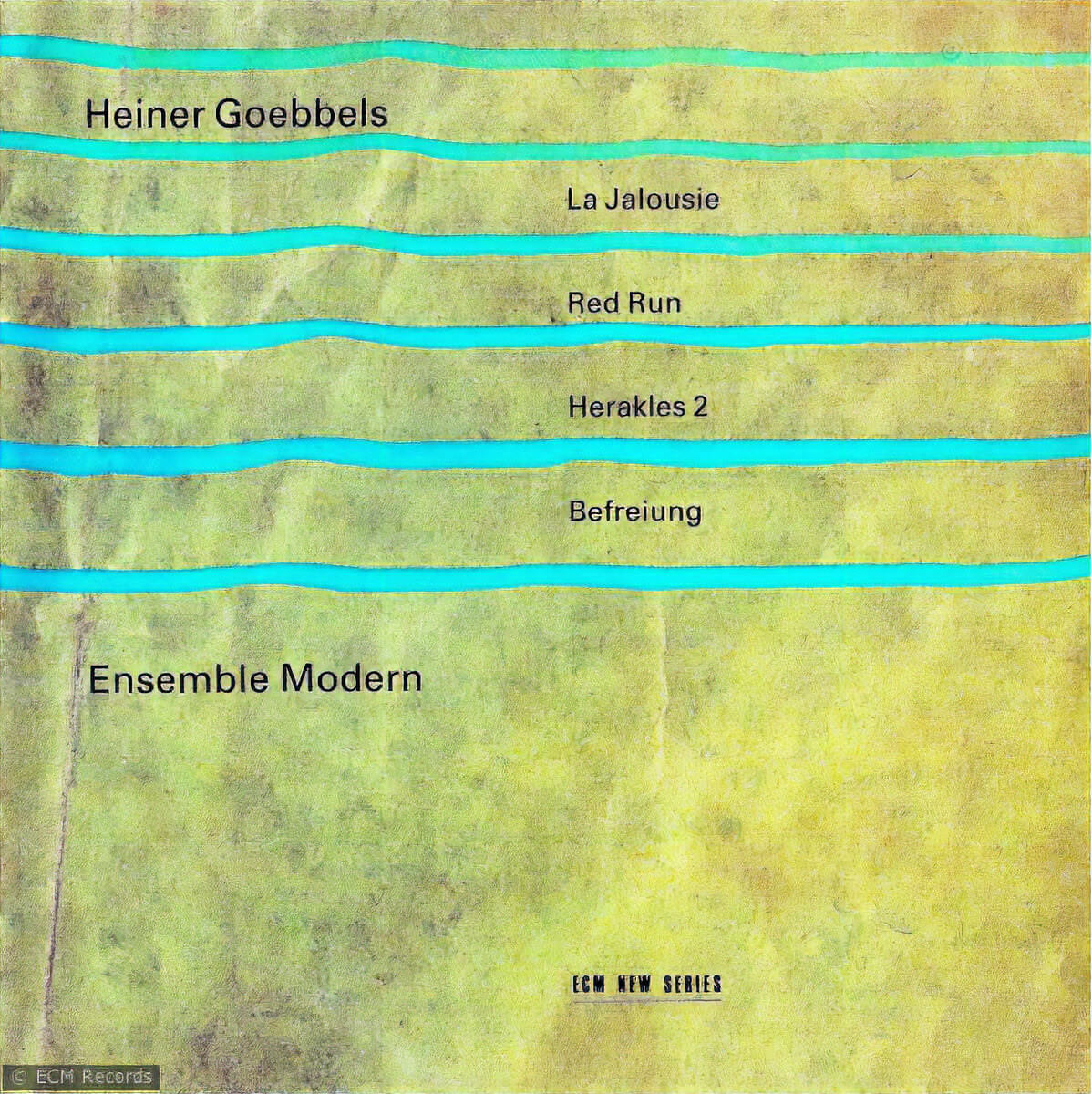La Jalousie, Red Run, Herakles 2, Befreiung
Heiner Goebbels/Ensemble Modern, 1992
Heiner Goebbels/Ensemble Modern
voices: Franck Ollu (La Jalousie), Christoph Anders (Befreiung)
Ensemble Modern: Eva Boecker, Gerard Buguet, Uwe Dierksen, Thomas Fichter, William Forman, Michael Klier, Hermann Kretzschmar, Catherine Milliken, Bruce Nockles, Klaus Obermaier, Franck Ollu, Rainer Roemer, Noriko Shimada, Wolfgang Stryi, Mathias Tacke, Dietmar Wiesner, Ueli Wiget
conductor: Peter Rundel
La Jalousie - noises from a novel
based on a text by Alain-Robbe Grillet
length: 18:10
La Jalousie, for 16 musicians, is, despite its relatively large instrumental forces, a rather quiet and cinematic piece. In French, "jalousie" has a double meaning referring both to an adjustable sun-shade, transparent from one side only, but it also means "jealousy". This differentiation is the theme of the "nouveau Roman" of the same name by French writer Alain Robbe-Grillet whom many will know as the scriptwriter of the cult film "Last Year at Marienbad"."La Jalousie" revolves around the jealousy of the husband-narrator who never actively participates in the tale, an unspoken, unacknowledged jealousy. It is the conditions and constellations, the manic perceptions and suppressions of this emotion that are minutely described and traumatically conveyed to the reader.
"She went to the port with Franck, to make some necessary purchases. She has not said what they were. Once the bedroom is empty, there is no reason not to open the blinds, which fill all three windows instead of glass panes. The three windows are similar, each devided into four equal rectangles, that is, four series of slats, each window-frame composing two sets hung one on top of another. The twelve series ..."
In Robbe-Grillet's autobiography I found a comment on this: "... an utterly indescribable world, built from the sounds around the house. How is it that so little has been said about the importance of hearing in this novel ...?" This I attempted in my composition, commissioned in 1991 by the Frankfurt Jazz Festival for the Ensemble Modern.
Red Run - nine songs for eleven instruments
length: 18:05
"Red Run" is the concertante version of a piece for ballet, written in 1988 in close co-operation with the musicians of the Ensemble Modern, the dancers of William Forsythe's Frankfurt Ballet Company, and the choreographer Amanda Miller. This was also my first encounter with the Ensemble Modern. The musicians played "Red Run" live on stage and were integrated into the choreography.
For the concertante version, I shortened slightly the original composition and used only the more rhythmically-accentuated parts. Even though everything is notated, there are still passages developed in improvisation. In "Red Run", unlike the later composed pieces on this CD, I still tried to write "songs" and "solos" for the participating musicians - instrumental songs for eleven instruments. It all begins rather innocently...
Herakles 2
for five brass players, drums and sampler
length: 14:59
This is the newest composition on the CD, commissioned by the Ensemble Intercontemporain of Paris who premiered the piece in January 1992 at the Musee d'Art Moderne. The title was taken from a prose text in Heiner Mueller's play "Zement" which describes Hercules' second task, his struggle with the Hydra, and the fighter's gradual transformation into his adversary, a fighting machine.
"For a long time, he believed he was still walking through the woods, in the stupefying hot winds that seemed to blow from all directions, making the trees twist like serpents in the immutable dusk, following a barely visible spoor of blood on the steadily shifting ground, alone in his battle with the beast ..."
In recent years I have worked almost exclusively with texts by Heiner Mueller, particularly in pieces for radio. An important pre-requisite was, of course, my interest in the content of his texts. However, the decisive factor for my work is the way in which the structural power, the syntax, and the timbre of his texts are always open for interpretation and imply forms that the music may take. In "Herakles 2", not a single sentence is spoken - the structure of the music is inspired by the architecture of the text.
Befreiung (Liberation)
concertante scene for narrator and ensemble
length: 14:09
In 1989 the Frankfurt Alte Oper asked me to write a composition for the "Frankfurter Feste" celebrating the 200th anniversary of the French Revolution. I hesitated for a long time because the hackneyed revolutionary vocabulary seemed to render a differentiated historical treatment impossible, particularly at that time (before the end of the GDR, Romania etc). Every furniture company appropriated it ("The revolution is Franz!"). I changed my mind when I rediscovered the anti-liberal, polemic tirade from Rainald Goetz's dramatic trilogy "Krieg".
I took out the texts of two characters - "Stammheimer" and "Heidegger" - from Scenes Two (Disintegration) and Three (Organisation) and tried to give them form by musical means. I do not intend, then, to resolve for the audience the political tension contained in these texts but unleash it for individual confrontation.
The piece also opposes theatrical convention which usually treats Rainald Goetz's rhythmic language merely naturalistically, deeming it necessary to give the characters a personality to provide psychological motives for good and evil, where, in fact, this serves only to protect us from establishing this distinction for ourselves.
Recorded May 1992
total playing time: 65:49
ECM NEW SERIES 1483
Texts
Schritte auf Stöckelschuhen (Review, de)
21 December 1993, Albrecht Dümling, Der Tagesspiegel
Geräusche aus einem Roman (Review, de)
Werke von Heiner Goebbels bei den Maifestspielen
5 June 1993, Hanno Ehrler, Frankfurter Allgemeine Zeitung